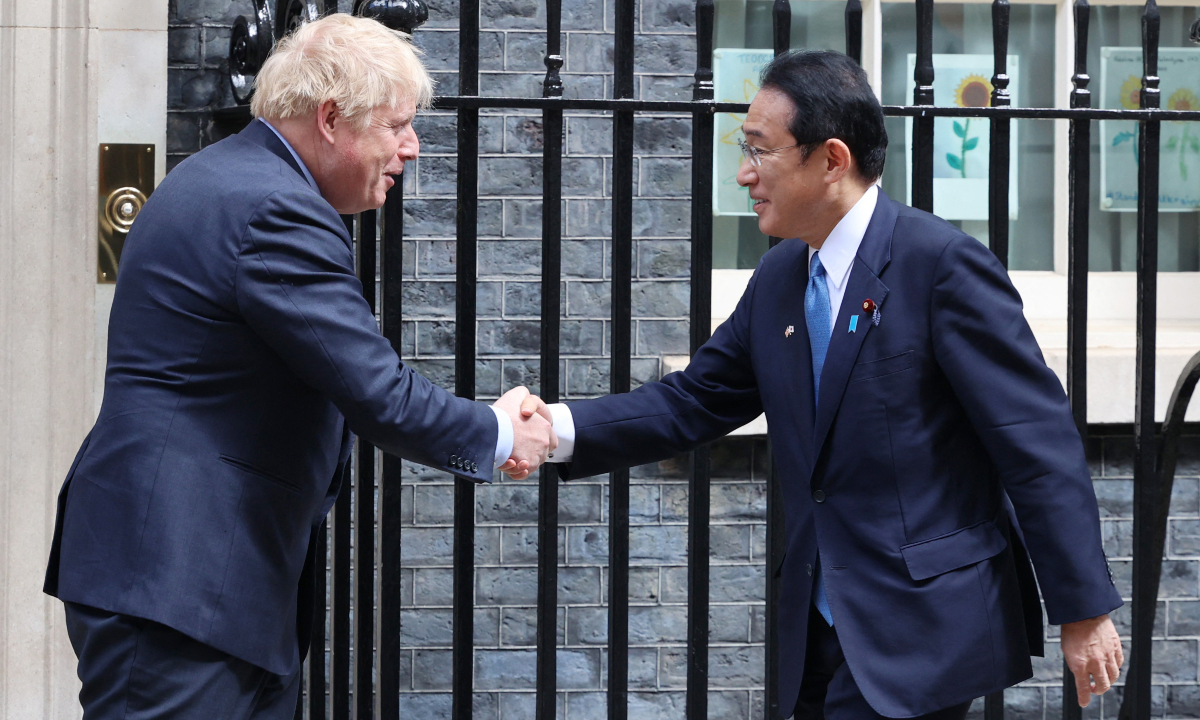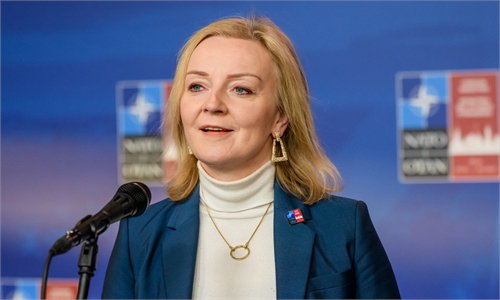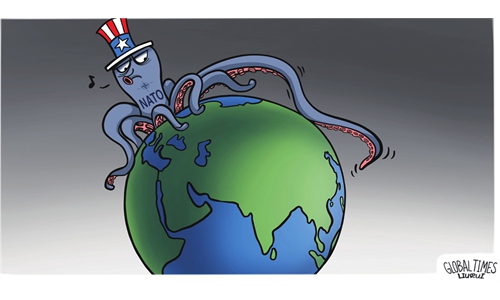Japan shouldn’t be a promoter for NATO’s Asia-Pacific expansion: Global Times editorial

Japanese Prime Minister Fumio Kishida (R) and British Prime Minister Boris Johnson shake hands prior to their meeting at 10 Dowing Street Office in London on May 5, 2022. Photo: AFP
The Ukraine crisis and the geopolitical tragedy it has triggered are not enough to kill the hunger of the US and some Western countries to reap political profits from the situation. Visiting Japanese Prime Minister Fumio Kishida and his British counterpart Boris Johnson agreed in principle on Thursday on a reciprocal access agreement between the Japanese Self-defense Forces and the British military. According to a statement from Johnson's office, the agreement is a "landmark defense partnership" and will boost "the UK's commitment to the Indo-Pacific." Meanwhile, Kishida made sensational remarks that "Ukraine may be tomorrow's East Asia," saying now is the time for the G7 leading nations to solidify their unity.
All these showy remarks reveal a dangerous tendency: NATO, which created division in Europe and waged wars around the world, is trying to apply the tricks of "bloc politics" and "confrontation between camps" to the Asia-Pacific region. For a long time, the UK has propagated on several occasions "the globalization of NATO" and the "need to preempt threats in the Indo-Pacific" and to ensure the island of Taiwan "is able to defend itself." Within the Asia-Pacific, Japan is abnormally active in catering to such a scheme. It seems Tokyo wants to be the "traitorous guide" for NATO's expansion in the Asia-Pacific region.
The US is undoubtedly behind this trend. In recent years, Washington has pushed its allies to coordinate with its strategy to look eastward. Some countries are willing to follow suit, although they all have their own calculations on this issue. London aims to recover its declining influence by "exploring the way" for Washington. Japan wants to take advantage of US connivance to break the "shackles" of the pacifist constitution and resurrect its militarism. The Ukraine crisis is a "good dish" for some politicians who have constantly escalated their voice and moves to create regional tensions.
It is worth noting that Japan has been very excited after the Ukraine crisis broke out. Recently, Japan's prime minister, foreign minister and defense minister engaged in diplomatic activities in neighboring countries, Europe and the US. Nevertheless, Asian countries that received Japanese officials have kept vigilant toward Tokyo's remarks and been reluctant to echo Japan. Not until in the UK, which wants to recover its glory, has Kishida felt some "warmth of a friend." This will easily make people recall the Anglo-Japanese Alliance in the 20th century.
Asian countries have different systems and cultures. They also have historical and realistic disputes. But they have maintained a generally stable situation in the past decades because they have been seeking common ground while putting aside differences. With vision beyond ideological and geopolitical divergence, Asian countries have engaged in pragmatic cooperation in the globalization era. These made Asia the most vital and dynamic region in the world and made "Asian century" a lasting discussion topic in the international strategic sphere.
Some people want to cooperate with the US and the West, and forcibly introduce the "security model" that has failed in Europe and caused serious consequences to the Asia-Pacific. Isn't that an intent to undermine regional peace and stability? The European security "crash" proves the US-led NATO system doesn't fit into current era. Those countries who talk about "Ukraine may be tomorrow's East Asia" are filled with self interests and serious about replicating one or more Ukrainian crises in other regions. Asian countries must remain on high alert.
History over and over again showed that a country's security cannot be based on other countries' insecurity. Dividing regional countries into those inside the alliance and those outside the alliance can only create more insecurity, where countries plunged into the paradox and trap of being vigilant and hostile against each other. The NATO military bloc is poison, not an antidote, to the security anxieties and tensions in the region. The sound situation in Asia must not be ruined by a "new cold war." Vigilance against and rejection of the "NATO expansion into Asia-Pacific" should become the strong consensus and collective consciousness of all countries in the region.
We also want to stress that we hope Japan will not undermine the overall environment for peace and development in the region. Such an act of "inviting the wolf into the room" will harm others and harm itself. History has taught us a profound lesson.



